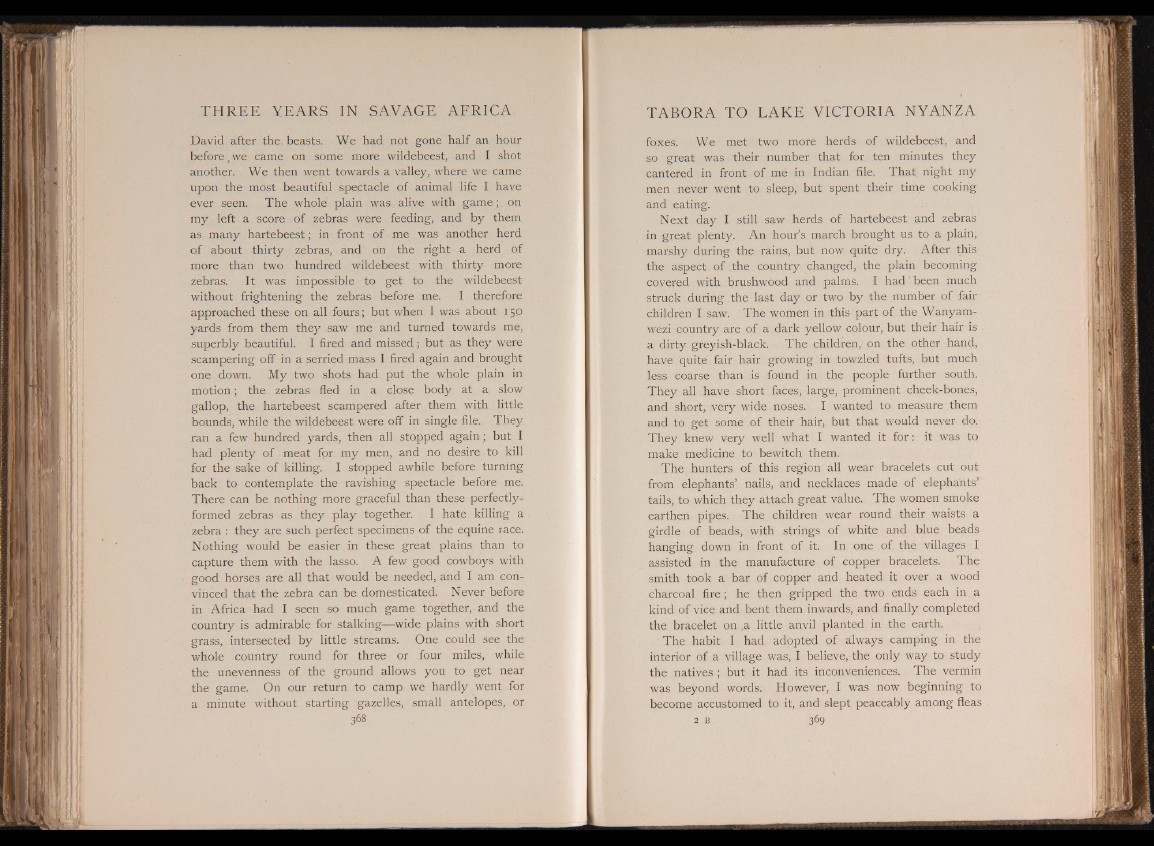
David after the. beasts. We had not gone half an hour
before, we came on some more wildebeest, and I shot
another. We then went towards a valley, where we came
upon the most beautiful spectacle of animal life I have
ever seen. The whole plain was alive with game; on
my left a score of zebras were feeding, and by them
as many hartebeest; in front of me was another herd
of about thirty zebras, and on the right a herd of
more than two hundred wildebeest with thirty more
zebras. It was impossible to get to the wildebeest
without frightening the zebras before me. I therefore
approached these on all fours; but when I was about 1 50
yards from them they saw me and turned towards me,
superbly beautiful. I fired and missed; but as they were
scampering off in a serried mass I fired again and brought
one down. My two shots had put the whole plain in
motion; the zebras fled in a close body at a slow
gallop, the hartebeest scampered after them with little
bounds, while the wildebeest were off in single file. They
ran a few hundred yards, then all stopped again; but I
had plenty of meat for my men, and no desire to kill
for the sake of killing. I stopped awhile before turning
back to contemplate the ravishing spectacle before me.
There can be nothing more graceful than these perfectly-
formed zebras as they play together. I hate killing a
zebra : they are such perfect specimens of the equine race.
Nothing would be easier in these great plains, than to
capture them with the lasso. A few good cowboys with
good horses are all that would be needed, and I am convinced
that the zebra can be domesticated. Never before
in Africa had I seen so much game together, and the
country is admirable for stalking—wide plains with short
grass, intersected by little streams. One could see the
whole country round for three or four miles, while
the unevenness of the ground allows you to get near
the game. On our return to camp we hardly went for
a minute without starting gazelles, small antelopes, or
368
foxes. We met two more herds of wildebeest, and
so great was their number that for ten minutes they
cantered in front of me in Indian file. That night my
men never went to sleep, but spent their time cooking
and eating.
Next day I still saw herds of hartebeest and zebras
in great plenty. An hour’s march brought us to a plain,
marshy during the rains, but now quite dry. After this
the aspect of the country changed, the plain becoming
covered with brushwood and palms. I had' been much
struck during the last day or two by the number of fair
children I saw. The women in this part of the Wanyam-
wezi country are of a dark yellow colour, but their hair is
a dirty greyish-black. The children, on the other hand,
have quite fair hair growing in towzled tufts, but much
less coarse than is found in the people further south.
They all have short faces, large, prominent cheek-bones,
and short, very wide noses. I wanted to measure them
and to get some of their hair, but that would never do.
They knew very well what I wanted it for: it was to
make medicine to bewitch them.
The hunters of this region all wear bracelets cut out
from elephants’ nails, and necklaces made of elephants’
tails, to which they attach great value. The women smoke
earthen pipes. The children wear round their waists a
girdle of beads, with strings of white and blue beads
hanging down in front of it. In one of the villages I
assisted in the manufacture of copper bracelets. The
smith took a bar of copper and heated it over a wood
charcoal fire; he then gripped the two ends each in a
kind of vice and bent them inwards, and finally completed
the bracelet on ,a little anvil planted in the earth.
The habit I had adopted of always camping in the
interior of a village was, I believe, the only way to study
the natives ; but it had its inconveniences. The vermin
was beyond words. However, I was now beginning to
become accustomed to it, and slept peaceably among fleas
2 b 369